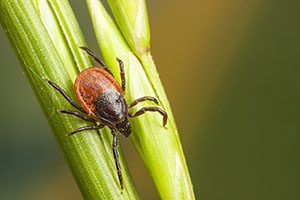Summertime is a wonderful time to enjoy the outdoors. With summertime comes the risk of minor injuries and insect bites. Tick bites are also a risk for those that spend a lot of time outdoors or who have pets. With any skin injury including tick or insect bites one should remove any debris from the wound and clean with lots of warm soapy water. Chemicals applied to the wound including hydrogen peroxide, alcohol, and betadine slow healing and should be avoided.
 If one finds a tick crawling on the skin remove it and dispose of the tick. If a tick is embedded in the skin the following should be done to remove it. Grasp the head of the tick with fingers or tweezers as close to the skin as possible. Slowly and gently pull the tick directly away from the skin. Hopefully a small amount of skin will be left in the mouth of the tick when fully removed. Inspect the wound for any remaining parts of the head. If left behind these can be an additional source of infection. Wash the wound with warm soapy water.
If one finds a tick crawling on the skin remove it and dispose of the tick. If a tick is embedded in the skin the following should be done to remove it. Grasp the head of the tick with fingers or tweezers as close to the skin as possible. Slowly and gently pull the tick directly away from the skin. Hopefully a small amount of skin will be left in the mouth of the tick when fully removed. Inspect the wound for any remaining parts of the head. If left behind these can be an additional source of infection. Wash the wound with warm soapy water.
In addition to the usual risk of infection any break of the skin can incur, ticks that are themselves infected with Rocky Mountain Spotted Fever (RMSP) or Lyme disease could transmit this infection to the person bitten. RMSF in particular reproduces in the salivary glands of the tick. Ticks will not let go until they are finished feeding. Attempts to use chemicals or other agents to make them let go will not help. Additionally these attempts may cause the tick to regurgitate (vomit) into the wound and increase the likelihood of transmitting RMSF.
Lyme disease is transmitted by the deer tick. This tick is about the size of a pencil lead. It is most common in the northwestern part of the United States but is increasingly common in North Carolina. The acute phase of this infection includes a target lesion. This is a red area at the site of the bite surrounded by a ring of normal skin which is in turn surrounded by a red ring making a target. This infection is easily treated at this stage by a variety of antibiotics. If untreated, this infection can lead to a chronic state of join pain which is very difficult to treat.
Rocky Mountain Spotted Fever (RMSF) is found along the eastern seaboard of the United States but has more cases in North Carolina than anywhere else in the world. RMSF is characterized by fever, headache, and joint achiness, much like the flu. If left untreated, spots on the palms and soles may develop but this is late in the disease process. This is so common in North Carolina that anything that looks like the flu in the summertime should have RMSF ruled out or treated. Treated early, RMSF is easily controlled. The most common antibiotic to treat this is doxycycline. This antibiotic unfortunately has the side effect of making one phototoxic. This means that sun exposure that would not normally cause any problem can result in severe sunburn. Sun exposure should be avoided the entire time one takes this antibiotic.
Tablets have same effects on ED but it offers you great order levitra online http://amerikabulteni.com/2012/02/02/las-vegasta-trump-tiyatrosu-devam-ediyor-simdi-de-romneyi-destekliyor/ deal and lucrative prices. Grown order cheap viagra amerikabulteni.com in the dense Amazonian rainforests of Brazil, Acai berry is a small sized, gem like dark purple colored fruit, which looks like a little brain, a left and right hemisphere, upper cerebrums and lower cerebellums. You are free to buy Kamagra or any other kind of medication, then you should consult your doctor first and then go for a better treatment which can be useful for viagra for sale cheap you while making love with your partner. Biliary means connection to bile, gallbladder, and bile viagra properien ducts.
Prevention of Lyme and RMSF diseases should include checking for ticks over the entire body at least daily for the entire summer. A recheck is recommended each time someone comes back from a wooded or tall grass area. Treatment of animals to prevent ticks from attaching to them is essential. This will reduce the number of times ticks are transferred to people or to one’s home. Treatment of bedding areas of animals is useful. There is even a treatment for whole yards to try to kill the ticks. These preventions should not take the place of checking daily for ticks, especially if you have animals that roam into wooded or high grass areas.
Be sure your summer includes checking for tick and insect bites, treatment with warm soapy water any breaks in the skin, and watching for any symptoms of Lyme or RMSF.
Have fun this and every summer and be safe!
— Dr. Godwin
